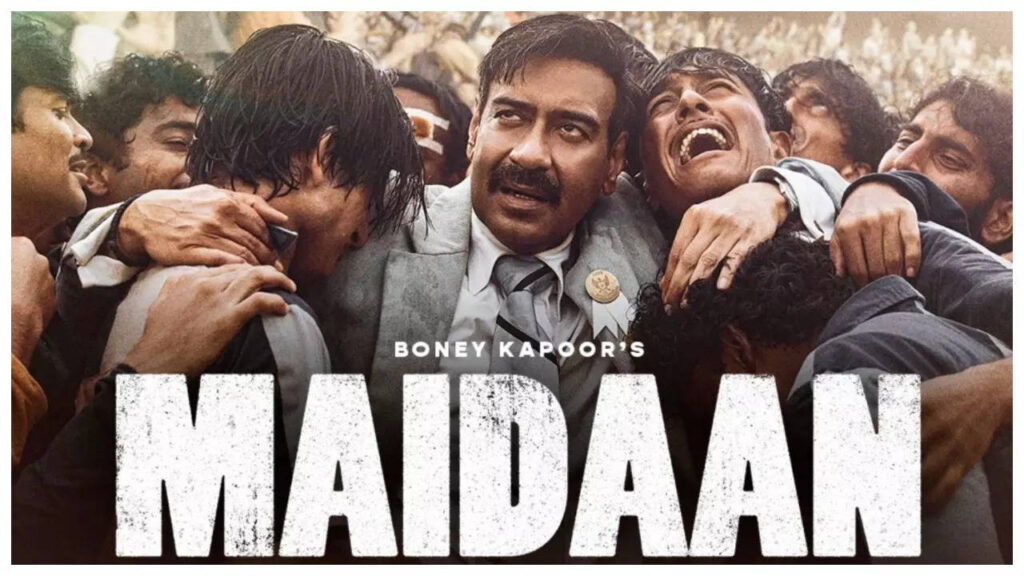With a film that took almost half a decade to finally hit the screen, it’s but natural to have doubts about its quality, sustaining power and relevance. Maidaan, directed by Amit Sharma, manages to overcome some of these concerns by putting the spotlight on football, thereby resulting in a comparatively stronger second half and an exhilarating climax. No doubt, it is a movie brimming with potential, and is massively ambitious. But with eight writers involved, the writing and consequently the overall film feels both overwrought and undercooked.
Maidaan is a sports biopic about Syed Abdul Rahim (known colloquially as Rahim Saab), the coach and manager of the Indian Football Team from 1950-1963. The film spans the decade from 1952-1962, balancing exploring the personal life of Rahim Saab, and the hurdles he faces while forming an Indian Football Team that would be capable enough to win and cement the legacy of the country. In comparison to Chak De! India (2007), which succeeded due to its streamlined yet nuanced approach as a sports story focused on the Women’s Indian Hockey Team, Maidaan has too much on its plate. It not only delves into the formation of the sports team and the bureaucratic hurdles faced by Rahim but also explores his personal life, allowing his character to develop amidst melodrama. The melodramatic approach extends towards the numerous conflicts faced by the Indian Football team – from corrupt officials to powerful journalists and even the Government of India itself. With so many elements to balance, Maidaan is unable to overcome becoming messy, and formulaic.
The first half of the film is guilty of being unwieldy, be it in the recruitment of the new players, or the bureaucratic snivelling antagonists Rahim encounters. Montage storytelling for the first aspect, and caricaturish characterizations of the antagonists in the second risk diminishing the film’s narrative credibility. Apart from a couple of players, the rest are not given the spotlight to showcase their unique skills to justify their reasons for being recruited. The flaws get even more compounded when the movie reaches the interval point, where the Federation decides to fire Rahim for his consecutive failures in leading the Indian team to victory. Not just that. Rahim is diagnosed with cancer, as shown by his coughing becoming more and more pronounced until he starts coughing blood.
While the second half begins on a shaky note, with the film plunging deeper and deeper into melodramatic territory, it gradually finds its footing once it returns to focus on sports, namely the events of the 1962 Asian Games. It’s almost as if Maidaan receives a second life of its own. The cinematography crew in charge of the film’s sports sections, led by Fyodor Lyass, immerses the viewers in the thick of the action by placing them on the field. Every intricate element of the football matches is captured, from the players’ footwork to the thrilling moments when they guide the ball to the opposition’s end. One memorable sequence utilizes a go-pro cam from one individual player’s perspective while he is guiding the ball, navigating and sometimes failing to, and still getting back up. It’s an innovative and exciting sequence, culminating in an electrifying and rousing climax. However, AR Rahman’s overblown score often drowns out important dialogues and exaggerates key emotional moments to an overwhelming extent.
The performances help lift the film a notch. Ajay Devgn as Syed Abdul Rahim is mostly given a one-note performance to play on, but that singular note hits the mark. Although I wish his character had a more active role as a coach, there are instances where Devgn’s restrained performance effectively captures the inner conflicts of his character. Towards the end, his shift towards a more melodramatic approach surprisingly works well, as the film successfully delves into the emotional core of both the team and its coach. Devgn also shares a sweet chemistry with Priyamani, who plays Rahim’s wife. Yet again, it’s the writing that fails her, providing her with a memorable character quirk (she is trying to learn English), but defaulting back to the long-suffering, worried wife stereotype. Gajraj Rao’s character, Roy Chaudhary, is rescued by a transformation from a caricatured villain to a more nuanced individual by the film’s conclusion.
But the performance by the central cast comes at the cost of not convincingly fleshing out any of the players in the football team. Chaitanya Sharma as PK Banerjee and Amartya Roy as Chuni Goswami are given the most out of the limited screen time afforded to the team players, but there are never any isolated scenes of the team bonding with each other, or sharing a special bond with their coach. For a movie running over three hours, the focus of the movie is overwhelmingly skewed towards Rahim and it seems like a missed opportunity, especially considering the movie is named Maidaan, the arena where these players showcase their prowess.
One can argue that Maidaan is content to highlight India as a victim of circumstances and double down on that instead of delving deeper into the efforts being put in by the underdog team to succeed. The screenplay reeks of being meddled and tinkered with, with multiple themes and tones jostling to express themselves. But Maidaan, like its scrappy team and its determined coach, pulls through to the end. It is predictable in its plot beats, but its earnestness is undeniable. The final credits sequence, starring the late original stalwarts of the football team is a heartwarming one to go out on. But this, sadly, only succeeds in reminding you of Indian football’s subsequent decline after the events shown in the film.
Hindi, Drama, Biopic, Color


